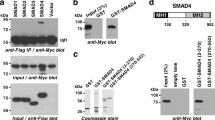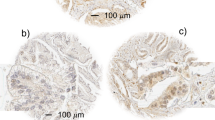Abstract
Alterations have been demonstrated in ligand and cognate receptor system of the transforming growth factor beta (TGF-β) pathway in prostate cancer (PC). Still, little is known about changes in the activity of the intracellular Smad cascade of TGF-β signaling during prostate carcinogenesis. We used immunohistochemistry to analyze phosphorylated Smad2 (p-Smad2), nuclear Smad4 and inhibitory-Smad7 in epithelial cells of normal, hyperplastic and malignant prostate. Specimens comprised 49 tissue cores of PC, 10 benign prostate hypertrophies and three normal prostates. Nuclear p-Smad2 (P<0.001) and nuclear Smad4 (P=0.023) were significantly decreased in PC with remarkable variations in cytoplasmic Smad7 levels. Substantial decreases in p-Smad2 and Smad4 levels were found in specimens with primary Gleason grades 3 and 4, whereas in grade 5, levels were markedly higher. Our results provide the first evidence for changes and reversible attenuation in the Smad system of the TGF-β pathway during prostate carcinogenesis.
This is a preview of subscription content, access via your institution
Access options
Subscribe to this journal
Receive 4 print issues and online access
$259.00 per year
only $64.75 per issue
Buy this article
- Purchase on Springer Link
- Instant access to full article PDF
Prices may be subject to local taxes which are calculated during checkout


Similar content being viewed by others
References
Jemal A, Murray T, Ward E, Samuels A, Tiwari RC, Ghafoor A et al. Cancer statistics. CA Cancer J Clin 2005; 55: 10–30.
Danielpour D . Functions and regulation of transforming growth factor-beta (TGF-beta) in the prostate. Eur J Cancer 2005; 41: 846–857.
Bello-DeOcampo D, Tindall DJ . TGF-betal/Smad signaling in prostate cancer. Curr Drug Targets 2003; 4: 197–207.
Martikainen P, Kyprianou N, Isaacs JT . Effect of transforming growth factor-beta 1 on proliferation and death of rat prostatic cells. Endocrinology 1990; 127: 2963–2968.
Akhurst RJ, Derynck R . TGF-beta signaling in cancer — a double-edged sword. Trends Cell Biol 2001; 11: S44–S51.
Guo Y, Jacobs SC, Kyprianou N . Down-regulation of protein and mRNA expression for transforming growth factor-beta (TGF-beta1) type I and type II receptors in human prostate cancer. Int J Cancer 1997; 71: 573–579.
Zeng L, Rowland RG, Lele SM, Kyprianou N . Apoptosis incidence and protein expression of p53, TGF-beta receptor II, p27Kip1, and Smad4 in benign, premalignant, and malignant human prostate. Hum Pathol 2004; 35: 290–297.
Feng XH, Derynck R . Specificity and versatility in TGF-signaling through smads. Annu Rev Cell Dev Biol 2005; 21: 659–693.
Ten Dijke P, Goumans MJ, Itoh F, Itoh S . Regulation of cell proliferation by Smad proteins. J Cell Physiol 2002; 191: 1–16.
Lebrun JJ, Takabe K, Chen Y, Vale W . Roles of pathway-specific and inhibitory Smads in activin receptor signaling. Mol Endocrinol 1999; 13: 15–23.
Chipuk JE, Cornelius SC, Pultz NJ, Jorgensen JS, Bonham MJ, Kim SJ et al. The androgen receptor represses transforming growth factor-beta signaling through interaction with Smad3. J Biol Chem 2002; 277: 1240–1248.
Carey JL, Sasur LM, Kawakubo H, Gupta V, Christian B, Bailey PM et al. Mutually antagonistic effects of androgen and activin in the regulation of prostate cancer cell growth. Mol Endocrinol 2004; 18: 696–707.
Brodin G, ten Dijke P, Funa K, Heldin CH, Landstrom M . Increased smad expression and activation are associated with apoptosis in normal and malignant prostate after castration. Cancer Res 1999; 59: 2731–2738.
Horvath LG, Henshall SM, Kench JG, Turner JJ, Golovsky D, Brenner PC et al. Loss of BMP2, Smad8, and Smad4 expression in prostate cancer progression. Prostate 2004; 59: 234–242.
Sheehan GM, Kallakury BV, Sheehan CE, Fisher HA, Kaufman Jr RP, Ross JS . Smad4 protein expression correlates with grade, stage, and DNA ploidy in prostatic adenocarcinomas. Hum Pathol 2005; 36: 1204–1209.
Itoh S, Landstrom M, Hermansson A, Itoh F, Heldin CH, Heldin NE et al. Transforming growth factor beta1 induces nuclear export of inhibitory Smad7. J Biol Chem 1998; 273: 29195–29201.
Latil A, Pesche S, Valeri A, Fournier G, Cussenot O, Lidereau R . Expression and mutational analysis of the MADR2/Smad2 gene in human prostate cancer. Prostate 1999; 40: 225–231.
Landstrom M, Heldin NE, Bu S, Hermansson A, Itoh S, ten Dijke P et al. Smad7 mediates apoptosis induced by transforming growth factor beta in prostatic carcinoma cells. Curr Biol 2000; 10: 535–538.
Xie W, Mertens JC, Reiss DJ, Rimm DL, Camp RL, Haffty BG et al. Alterations of Smad signaling in human breast carcinoma are associated with poor outcome: a tissue microarray study. Cancer Res 2002; 62: 497–505.
MacGrogan D, Pegram M, Slamon D, Bookstein R . Comparative mutational analysis of DPC4 (Smad4) in prostatic and colorectal carcinomas. Oncogene 1997; 15: 1111–1114.
Kang Y, He W, Tulley S, Gupta GP, Serganova I, Chen CR et al. Breast cancer bone metastasis mediated by the Smad tumor suppressor pathway. Proc Natl Acad Sci USA 2005; 102: 13909–13914.
Acknowledgements
We thank Marianne Kuuslahti and Tiina Keisala for their skillful technical assistance. This study was supported by grants from the Medical Research Fund of Tampere University Hospital the Finnish Cancer Foundation and the Finnish Academy.
Author information
Authors and Affiliations
Corresponding author
Rights and permissions
About this article
Cite this article
Perttu, M., Martikainen, P., Huhtala, H. et al. Altered levels of Smad2 and Smad4 are associated with human prostate carcinogenesis. Prostate Cancer Prostatic Dis 9, 185–189 (2006). https://doi.org/10.1038/sj.pcan.4500871
Received:
Accepted:
Published:
Issue Date:
DOI: https://doi.org/10.1038/sj.pcan.4500871
Keywords
This article is cited by
-
Matriptase-2/NR4A3 axis switches TGF-β action toward suppression of prostate cancer cell invasion, tumor growth, and metastasis
Oncogene (2022)
-
High p-Smad2 expression in stromal fibroblasts predicts poor survival in patients with clinical stage I to IIIA non-small cell lung cancer
World Journal of Surgical Oncology (2014)
-
PIAS1-modulated Smad2/4 complex activation is involved in zinc-induced cancer cell apoptosis
Cell Death & Disease (2013)
-
Transcription alterations of members of the ubiquitin–proteasome network in prostate carcinoma
Prostate Cancer and Prostatic Diseases (2011)
-
Integration of gene chip and topological network techniques to screen a candidate biomarker gene (CBG) for predication of the source water carcinogenesis risks on mouse Mus musculus
Ecotoxicology (2011)



